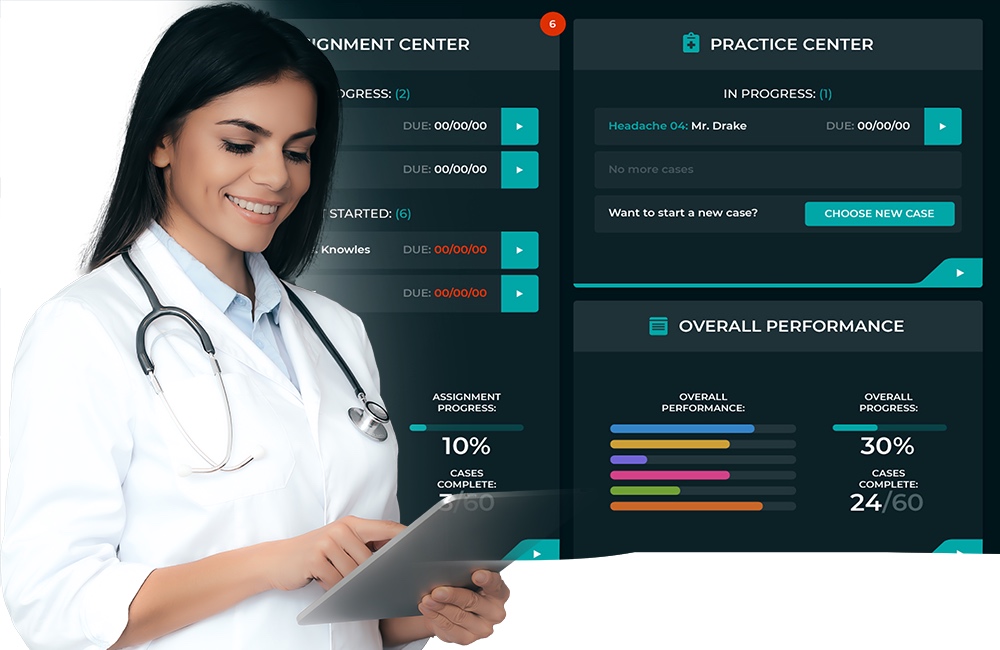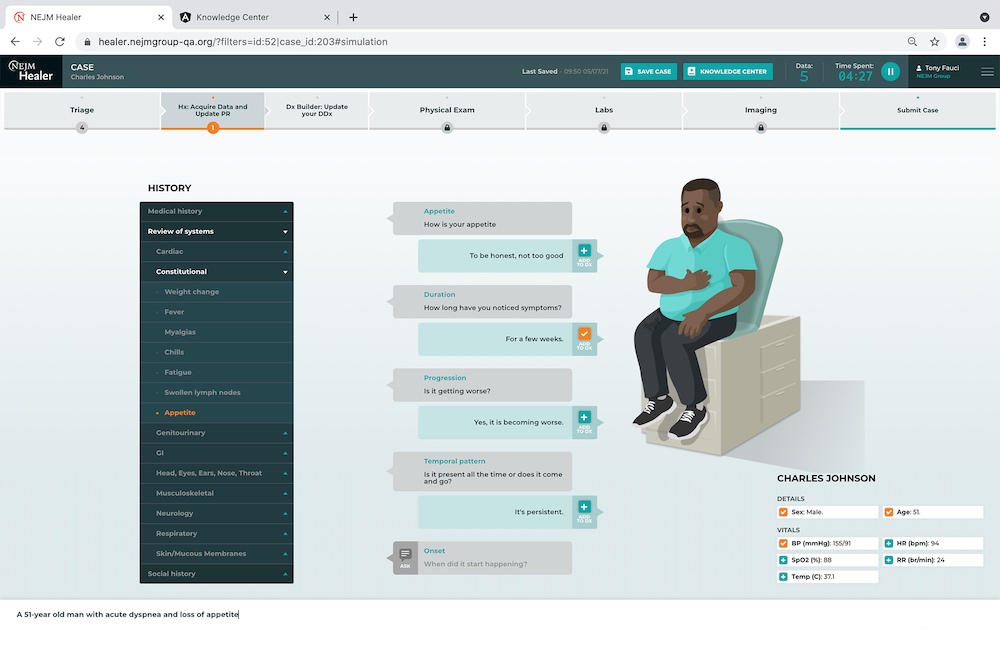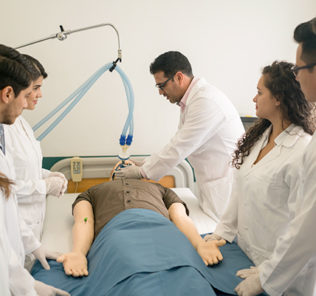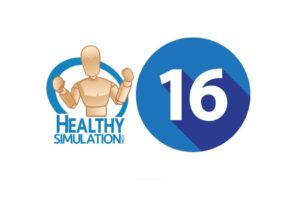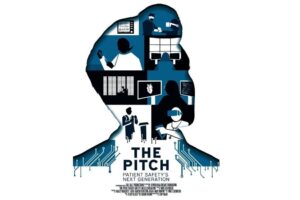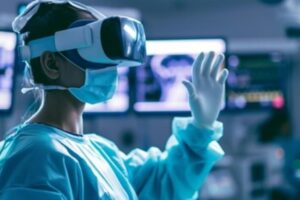NEJM Healer Helps Systematically Develop Diagnostic Skills
A new agreement between Education Management Solutions (EMS) and the NEJM Group shows that medical simulation is no longer a niche industry. As COVID-19 has forced every healthcare institution in the world to rethink its use of distance-based simulation technologies to educate and train clinicians, the announcement of NEJM Healer further demonstrates medical simulation’s roared into the healthcare mainstream.
Approximately 14 months ago, the pandemic became a national healthcare crisis. Two months later, NEJM Healer was launched for just-in-time clinical diagnosis training for medical doctors. Since then, nearly 300,000 medical students, residents, and practicing clinicians globally have used the training. Now, the NEJM Group and EMS agreement may put Healer in front of every medical student in America.
NEJM Group, a division of the Massachusetts Medical Society, the publisher of the New England Journal of Medicine, has been a leader of new medical research and review articles for over 200 years. While steeped in history, the NEJM Group is making waves into the future of healthcare education and training this week with an announcement of NEJM Healer, a cloud-based patient diagnostic trainer integrated with Education Management Solutions’ SIMULATIONiQ platform. The expanded platform will provide turnkey virtual live standardized patient encounters alongside a clinical reasoning case. Now, learners within the SIMULATIONiQ platform can move directly from a SP encounter directly into a Healer case – all using a single sign on for both platforms.
Sponsored Content:
Over the last year, the coronavirus pandemic forced healthcare institutions to transition classroom learning to a fully remote alternative. Even now as the world takes steps closer to herd immunity, the demand for more digital learning platforms has continued to grow. Within healthcare, this has fueled the production of virtual patients to help medical learners progress through their education despite pandemic-related barriers.
In an effort to enter the digital age of healthcare simulation training, NEJM Group has partnered with Education Management Solutions (EMS) to release NEJM Healer. This new online application is designed to provide a systematic way to develop students’ diagnostic skills. Clinical learners can utilize NEJM Healer to practice gathering patient data thoroughly, create iterative problem representations, activate illness scripts, build broad differential diagnoses, and apply likelihood ratios to home in on a lead diagnosis and create a sound management plan.
“The coronavirus pandemic has accelerated the worldwide adoption of telemedicine and virtual clinical practice and training. The distributor agreement with NEJM Group will put EMS on the front of this transformation by using our industry-leading virtual healthcare simulation testing and educational programs to better prepare medical students for the realities of hands-on patient care,” said EMS Founder and President Anurag Singh.
Both NEJM Group and EMS recognize the importance of expanding digital learning opportunities, and therefore embarked on the project to create a proprietary algorithmic assessment. Using virtual simulation, the NEJM Healer provides summary performance scoring and detailed feedback. This is the direction that the future of medical education is heading, as telemedicine and e-learning become the new “normal.”
Sponsored Content:
About NEJM Healer
NEJM Healer brings clinical knowledge and clinical reasoning together, teaching and assessing at every stage of the patient encounter – from triage to history taking, physical examination, obtaining lab results and imaging. Learners become more thorough and efficient as they work through the virtual patient cases developed by a physician educator team from NEJM Group. Along the way, they can also access expert illness scripts and diagnostic schema to support their learning
NEJM Healer packages the most current and reliable clinical information in a strategically curated library of patient cases to deliver an efficacious and engaging learning experience. Ideal for medical schools, physician assistant programs, and other clinical training programs, this application eliminates trendy avatars to reduce cognitive load and allow learners to focus on the actual clinical reasoning process.
Using NEJM Healer, learners can engage in a simple to use but academically immersive 2D virtual patient encounter. Here are key benefits of the NEJM Healer:
Demystifies Clinical Reasoning: NEJM Healer takes the mystery out of clinical reasoning by disaggregating the process into discrete steps and exposing the underpinnings of its data-driven process. NEJM Healer offers a standardized and measurable way to learn and deliberately practice diagnosis. Learners are taught how to approach complex scenarios with a level of detail that even experts may find difficult to articulate.
Combines Knowledge and Reasoning: Professional medical practice combines both knowledge and reasoning. To that end, NEJM Healer brings expert-created illness scripts and diagnostic schemas together with highly interactive patient cases – all built on a foundation of current cognitive science.
Offers Gold-Standard Content: NEJM Healer is the premier resource for teaching and assessing clinical reasoning. NEJM Healer is from NEJM Group, the world’s most trusted source for medical research and education. NEJM Group editors assembled experienced clinicians and leaders in the clinical reasoning field to develop the content and advanced software engine.
Patient Data Acquisition: NEJM Healer breaks patient cases down into granular data, prompting the learner to consider what questions to ask and what labs to access. Students learn through deliberate practice what patient responses and test results are relevant to the differential diagnosis process.
Problem Representation: Throughout the virtual patient encounter, students get prompted to create and then update their problem representation. NEJM Healer measures users’ data acquisition skills to deliver targeted feedback at the end of each case. Students compare themselves to an expert clinician on all facets of the encounter.
Differential Diagnosis (Dx) Builder: The Dx Builder is at the center of the NEJM Healer experience. After acquiring sufficient patient data, students move to the Dx Builder to select likely diagnoses. The Dx Builder’s highly visual environment empowers users to assign weighted values to each of the pertinent findings they’ve gathered and systematically work their way through the clinical reasoning process. They see visually how each datum affects the likelihood of the presence or absence of the diseases in their differential.
Performance Feedback and Assessment: Before NEJM Healer came onto the market, there was no standardized method for assessing clinical reasoning. Educators in large part relied on clinical skills exams as a proxy for measuring learners’ clinical reasoning abilities. NEJM Healer breaks through this barrier with a proprietary algorithmic assessment that provides summary performance scoring and detailed feedback on the clinical reasoning process learners follow across virtual patient cases – comparing learner decision-making to that of an expert.
Additionally, NEJM Healer has a proprietary assessment system that provides users with a performance summary and detailed feedback on their clinical reasoning process in each virtual patient encounter compared to that of an expert. Students can also track their progress over time on key performance indicators, and educators can look across a cohort to gauge progress and target students in need of targeted remediation.
NEJM Healer also supports the formal instruction of clinical reasoning as part of a focused course syllabus, a point-in-time assessment (e.g., OSCE or end-of-rotation exam), or across the broader curriculum spanning pre-clinical and clinical learning. Educators can assign cases to a class and assess an individual learner’s reasoning skills using systematized performance data. Instructors can also debrief cases with students in a live classroom setting. Finally, faculty can assign additional cases to students who require added clinical reasoning support and create clinical remediation plans that include NEJM Healer case practice.
Learn More About NEJM Healer
Lance Baily, BA, EMT-B, is the Founder & CEO of HealthySimulation.com, which he started while serving as the Director of the Nevada System of Higher Education’s Clinical Simulation Center of Las Vegas back in 2010. Lance is also the Founder and acting Advisor to the Board of SimGHOSTS.org, the world’s only non-profit organization dedicated to supporting professionals operating healthcare simulation technologies. His co-edited Book: “Comprehensive Healthcare Simulation: Operations, Technology, and Innovative Practice” is cited as a key source for professional certification in the industry. Lance’s background also includes serving as a Simulation Technology Specialist for the LA Community College District, EMS fire fighting, Hollywood movie production, rescue diving, and global travel. He and his wife Abigail Baily, PhD live in Las Vegas, Nevada with their two amazing daughters.
Sponsored Content:



